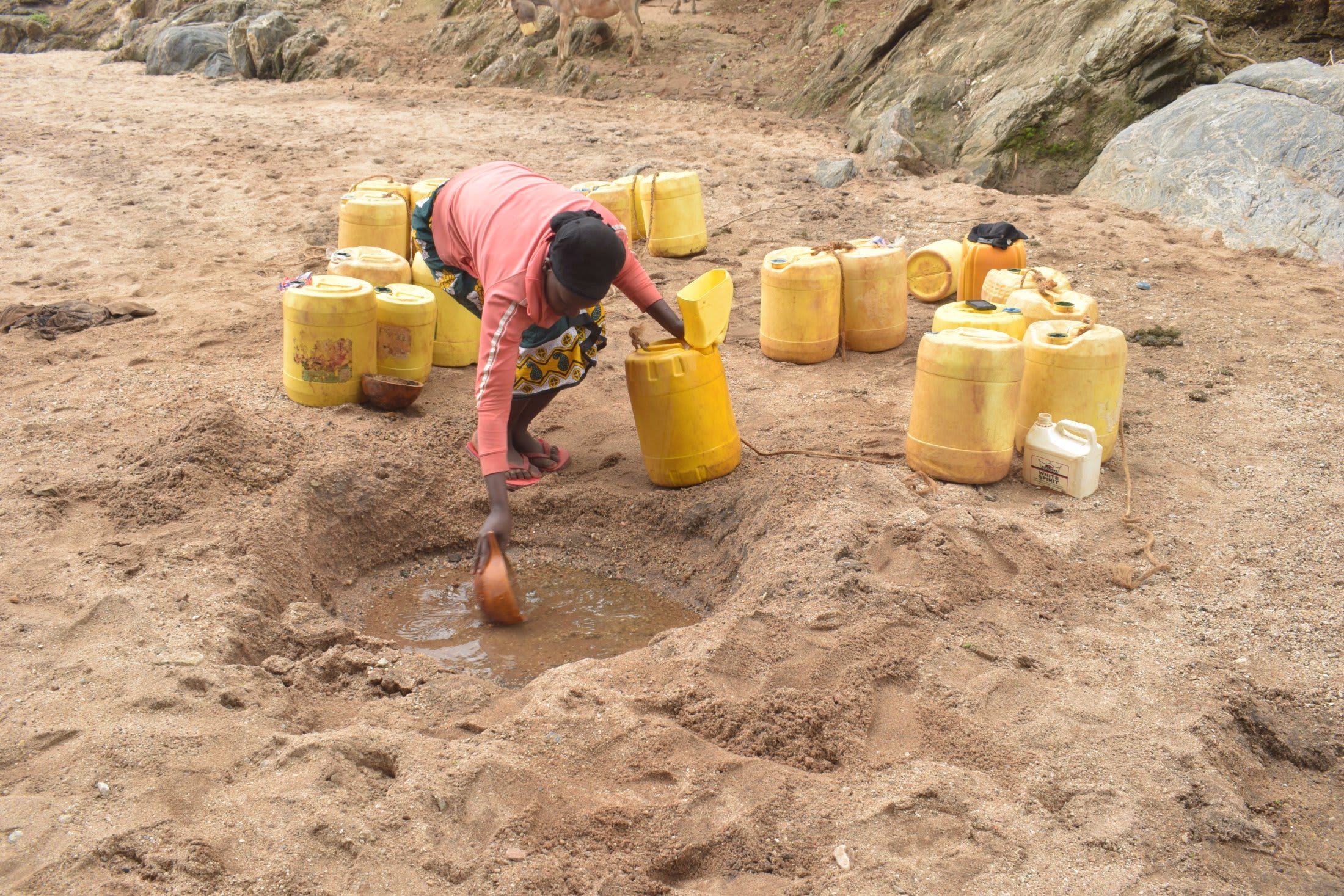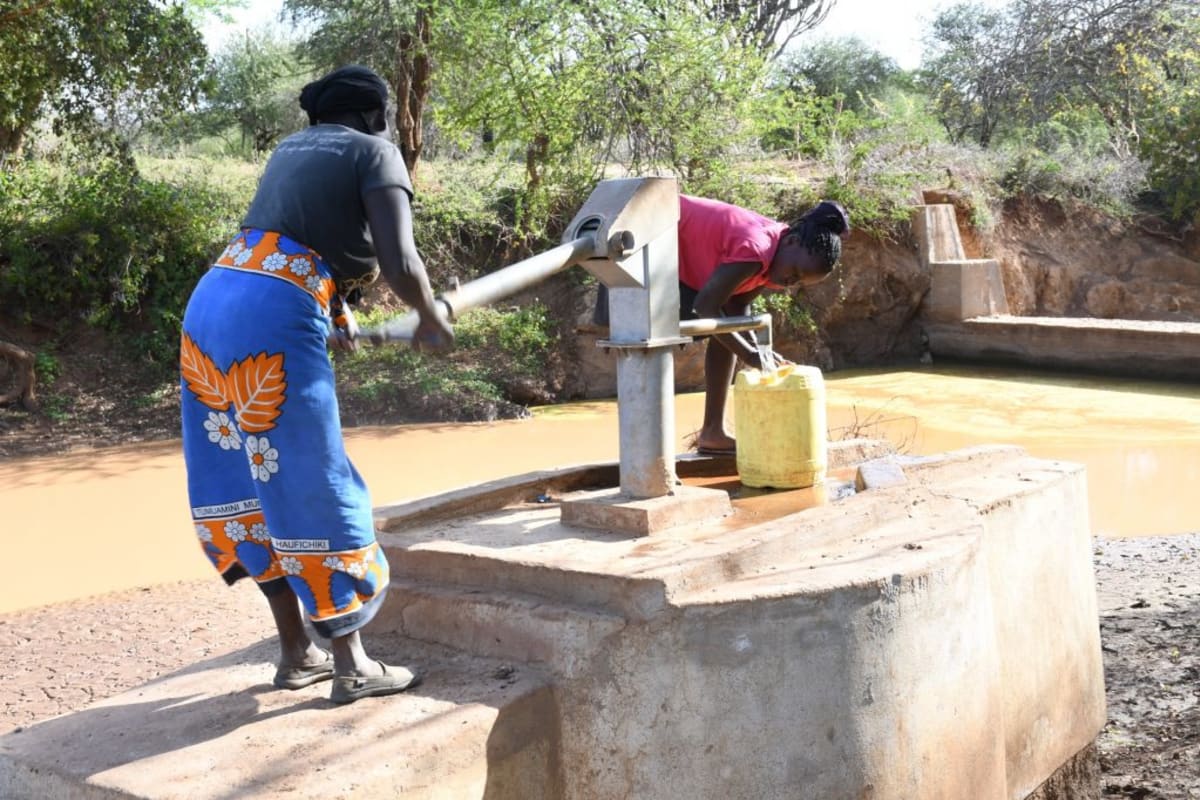On an average day in Mbitini, Kenya, women and children wake up early in the morning to start the day. The women prepare breakfast for the family as the children get ready for school. The men, on the other hand, wake up to go to the farm to get Napier grass for the livestock. They also prepare to run errands.
When the men and children are off, the women then go to fetch water in the best possible source depending on the time of the year.
The main water sources for this group of people are scoop holes dug in the nearest river bed. During the dry season, some people spend more than 2 hours each day fetching water because they have to travel to river beds that are farther away. The time lost to fetching water each day is a great burden on some families.

“Getting water is always hard here, especially during the driest months of the year. I have been caught up in the water scarcity mess, sometimes ending up using muddy water for drinking and cooking," said Esther Mutua, a 45-year-old farmer.
"On other occasions, fetching water becomes a day-long affair that leaves no time to engage in other income-generating activities."
The sources are open and a majority of locals travel with donkeys to help carry the water back home. The surrounding environment is littered with donkey waste which exposes the water to an array of contaminants.
Drinking this dirty water causes a variety of health problems. Community members reported complications including stomach problems, dysentery, and typhoid which were all linked to the use of water from the open river sources.
“The prevailing water conditions have been detrimental to our lives as people living in this locality. Available water sources do not provide clean water and they are found very far from us," said Daniel Mwangangi, a farmer in the community.
"This has led to long walks in search of water. It totally compromises our hygiene standards while also exposing us to disease outbreaks.”
Hygiene and sanitation standards within the community were described as "below average" by our field officers. They observed that the majority of the households they visited exhibited poor water handling, low latrine hygiene standards, and no traces of water treatment.
After arriving home with the water, the day continues for the women in the community with household chores such as washing clothes and preparing lunch for when the children and men take a break. The women will help with the farm in the afternoon if there is time. Many families rely on farming to make a living and grow some of the food that they eat. Some of the men will work informal labor jobs in the nearby larger towns or work in the capital city of Nairobi and send money back home to their families.
The day comes to an end with dinner, cooked by the female head of the household. Everyone then retires to bed to rest up for a new day to begin.
Reliable Water for People in Mbitini
Our main entry point into Mbitini Community has been the Mathyakani Self-Help Group, which is comprised of local households that are working together to address water and food scarcity in their region. These members will be our hands and feet in both constructing water projects and spreading the message of good hygiene and sanitation to all community members in this area.
Hand-Dug Well
This particular hand-dug well will be built adjacent to a sand dam project, which will supply clean drinking water once it rains. We have supplied the group with the tools needed for excavation. With the guidance of our artisans and mechanics, the excavated well will be cased, sealed with a well pad, and then finished with a new AfriDev pump.
Excavation takes a month or more on average, depending on the nature of the rock beneath. Construction of the well lining and installation of the pump takes 12 days maximum. The well will be lined with a concrete wall including perforations so that once it rains, water will filter in from the sand dam.
This well will be located within Mbitini Village and will bring clean water to nearby families that must currently walk long distances to get water.
New Knowledge
These community members currently do their best to practice good hygiene and sanitation, but their severe lack of water has been a big hindrance to reaching their fullest potential.
We will hold hygiene and sanitation training sessions with the Mathyakani Self-Help Group and other community members to teach about important hygiene practices and daily habits to establish at the personal, household, and community level. This training will help to ensure that participants have the knowledge they need to make the most out of their new water point as soon as water is flowing.
One of the most important topics we plan to cover is the handling, storage, and treatment of water. Having a clean water source will be extremely helpful, but it is useless if water gets contaminated by the time it is consumed. We will also emphasize the importance of handwashing.
We and the community strongly believe that all of these components will work together to improve living standards here, which will help to unlock the potential for these community members to live better, healthier lives.
We typically work with self-help groups for 3 to 5 years on multiple water projects. We will conduct follow-up visits and refresher trainings during this period and remain in contact with the group after all of the projects are completed to support their efforts to improve sanitation and hygiene.

 Protected Dug Well
Protected Dug Well
 Rehabilitation Project
Rehabilitation Project

































